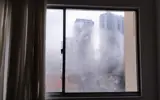How Urban Pollution Specifically Affects Glass Façades and What Can Be Done

In our cities, glass façades define skylines. They reflect light, convey prestige, and help modern buildings stand out. But while they look impressive, they are also constantly under attack from the very environment they are built to rise above.
Urban pollution has a significant impact on glass façades, both in terms of aesthetics and performance. City grime, acid rain, and smog all contribute to long-term degradation if not properly managed. In this blog, we explore what really happens to glass in polluted urban areas and share practical steps building owners can take to protect their investment.
The Effects of Urban Pollution on Glass
1. City Grime and Particulate Matter
Airborne pollutants such as soot, dust, and vehicle exhaust particles are constantly circulating in city air. These particles settle on glass surfaces, creating a thin, often oily layer of grime. Left unchecked, this grime can etch into glass over time, especially when combined with moisture or cleaning chemicals.
2. Acid Rain
Acid rain forms when sulphur dioxide (SO₂) and nitrogen oxides (NOₓ), released from burning fossil fuels, mix with water vapour in the atmosphere. When this falls as rain, it can react with the silica in glass or any metal components in the façade. Repeated exposure may cause pitting, hazing, or a milky appearance on the glass surface.
3. Smog and Chemical Residues
Smog is a mix of pollutants, including ozone, nitrogen dioxide, and volatile organic compounds. These chemicals interact with each other and with environmental elements like sunlight and moisture. Over time, they leave invisible residues that interfere with the clarity and reflectivity of glass, especially if the glass is coated for solar control or insulation.
The Hidden Cost of Neglect
Allowing pollution to build up on a façade can lead to permanent damage. Stains can become engrained. Coatings can deteriorate. Glass may require premature replacement. Worse still, poorly maintained façades can diminish the appearance and perceived value of a building, affecting tenant satisfaction and energy efficiency.
What Can Be Done to Protect Glass Façades?
1. Scheduled Specialist Cleaning
Regular cleaning by professionals using the correct techniques is the most effective way to protect glass façades. This includes soft-bristle brushes, purified water systems, and non-abrasive agents that remove contaminants without damaging coatings or sealants.
2. Use of Protective Coatings
Applying hydrophobic or photocatalytic coatings can help repel water, reduce grime adhesion, and break down organic pollutants on the surface. These coatings do not eliminate the need for cleaning but can significantly extend the time between cleans.
3. Routine Inspections and Maintenance
It is important to identify early signs of damage such as pitting, streaking, or discolouration. Inspections should also assess sealant joints and glazing systems to prevent moisture ingress, which can make existing pollution issues worse.
4. Consider the Environment in Glass Selection
Modern glazing technologies offer improved resistance to pollutants. Low-maintenance glass and self-cleaning variants are designed specifically with urban conditions in mind and can reduce upkeep costs in the long term.
Final Thoughts
Urban pollution is not going away, but its effects on glass façades can be controlled. With proactive maintenance, appropriate materials, and expert support, buildings can retain their visual appeal and structural integrity even in the most challenging city environments.
At Glass Aftercare, we work closely with property owners, managers, and facilities teams to develop façade management plans tailored to the specific environmental challenges of each building. If you want to preserve the performance and appearance of your façade, we are here to help.

About the author
Glass Aftercare
Glass Aftercare is the commercial glass maintenance, façade refurbishment and glazing repair specialist. Providing a service you can trust, all across London and the Home Counties.
GLASS AFTERCARE ARE TRUSTED BY








